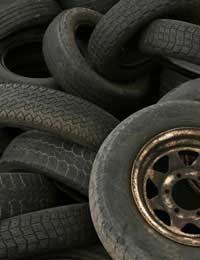Recycling Tyres

Cars buses, planes – most of our transport systems rely on tyres. Most of our food and consumer goods is delivered by truck, hence our reliance on tyres to smooth the way is immense. We all know what a pain it is when we get a puncture – but what happens when we come to change our tyres?
How are Tyres Recycled?
Tyres are made from vulcanised rubber. This is a very tough form of chemically enhanced rubber.This material contains highly toxic, both for humans and the environment, substances, and is a potential fire hazard. When incinerated, tyres produce a lot of pollutants which are dangerous when released into the atmosphere. When put into landfill, tyres take a considerable amount of time to break down.
Retreading Tyres
One option for dealing with used tyres is a process called retreading.This is a process that replaces the tread section of the tyre, that has the continued traction with the road, or the entire outer surface of the tyre. Within the UK, truck tyres can be retreaded up to 3 times, and car tyres just once. These procedures are strictly regulated by the Government.
Within the UK, 50% of truck tyres, and currently all aeroplane tyres, are retreaded, but this practice is declining, mainly due to budget tyres, produced cheaply overseas, flooding the market.
Other Options for Dealing with Tyres
Some landfill companies are now operating a tyre chipping scheme. Tyres are brought to the landfill site in bulk from recycling centres, and are cut into chips or granulated. This can then be used in a variety of ways – as carpet underlay, as a soft cushioning material for children's play areas, or reprocessed further, and used to make rubber mats and other goods.Tyres can also be de-vulcanised and re-converted into rubber. This is of poor quality, but it can be mixed with virgin material to produce new tyres and other consumer rubber goods.Often, landfill companies use tyres as they are in the landfill to create a drainage system. This can lead however to toxic chemicals leaching from the rubber and into water systems.


Re: Recycling White Goods
I have my old refrigerator & dishwasher to be given away.
Re: Recycling White Goods
HI I am in need of a spider shaft for my Samsung front loader washing machine. Can anyone help me with one please I am on a disability…
Re: Recycling White Goods
I have an all drink frig and a dishwasher both domestic appliance both working need more space at home
Re: Rules Governing Use of Recycling Logo
I am so confused with recycling labels. Nothing seems standardised? Surely, it should be a case of 2 options Recycle…
Re: How to Recycle Our Office Telephones?
The Parish Council would like to donate the following phone system, if someone could come and collect it. Panasonic…
Re: How to Recycle Our Office Telephones?
We have Phones that we would like to recycle. Poly Phone models CX300 x 20 CX600 x 28 Cx700 x 2 Vvx600 x…
Re: More Environmentally Friendly to Use Glass Milk Bottles?
Why is it more expensive to wash and refill bottles for milk than using a new carton which is…
Re: More Environmentally Friendly to Use Glass Milk Bottles?
I would like to get free range milk in glass bottles, is this possible?
Re: More Environmentally Friendly to Use Glass Milk Bottles?
Do you have recycling experts to talk to? As I am creating new vegan skin care brand and the…
Re: More Environmentally Friendly to Use Glass Milk Bottles?
We have recently started having our milk delivered in glass bottles by a local dairy. At…